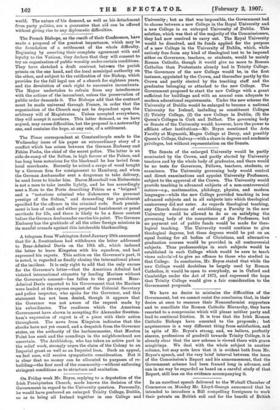In an excellent speech delivered to the Walsall Chamber of
Commerce on Monday Mr. Lloyd-George announced that he intended to introduce a Bill compelling foreigners to work their patents on British soil and for the benefit of British
industry. This decision, which involves the abandonment of the unsatisfactory compromise of the Patent Act of 1902, has been hailed in some quarters as indicating a tendency on the part of the President of the Board of Trade to break loose from Cobdenism, and admit the need of reciprocity, if not Protection; but the argument seems to us farfetched. No such question of principle, however, is involved in the important and satisfactory announcements made by Mr. Lloyd-George in regard to the measures about to be taken in order to render the Intelligence Department of the Board of Trade more effective, to enhance the practical utility of Consular Reports, and in general to strengthen the Consular Service. Here we find ourselves entirely in accord with the comments of the Times. All these improvements will be of little avail if the general conditions of the Consular Service fail to attract or retain men of the right stamp. A contrary method is adopted in Germany and other countries, where promotion to some of the higher and more responsible diplomatic appointments is open to Consular officials. With us the tendency of recent years has been "to make the barrier between the two services more insurmountable than ever." In these circumstances, as the Tines puts it, "it is all the more important that the whole conditions of the Consular Service, as to emoluments, leave, and general status, should be put on a more satisfactory footing."







































 Previous page
Previous page